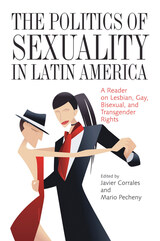
The Politics of Sexuality in Latin America presents the first English-language reader on LGBT politics in Latin America. Representing a range of contemporary works by scholars, activists, analysts, and politicians, the chapters address LGBT issues in nations from Cuba to Argentina. In their many findings, two main themes emerge: the struggle for LGBT rights has made significant inroads in the first decade of the twenty-first century (though not in every domain or every region); and the advances made were slow in coming compared to other social movements.
The articles uncover the many obstacles that LGBT activists face in establishing new laws and breaking down societal barriers. They identify perhaps the greatest roadblock in Latin American culture as an omnipresent system of “heteronormativity,” wherein heterosexuality, patriarchalism, gender hierarchies, and economic structures are deeply rooted in nearly every level of society. Along these lines, the texts explore specific impediments including family dependence, lack of public spaces, job opportunities, religious dictums, personal security, the complicated relationship between leftist political parties and LGBT movements in the region, and the ever-present “closets,” which keep LGBT issues out of the public eye.
The volume also looks to the future of LGBT activism in Latin America in areas such as globalization, changing demographics, the role of NGOs, and the rise of economic levels and education across societies, which may aid in a greater awareness of LGBT politics and issues. As the editors posit, to be democratic in the truest sense of the word, nations must recognize and address all segments of their populations.

Is Venezuela’s Bolivarian revolution under Hugo Chávez truly revolutionary? Most books and articles tend to view the Chávez government in an either-or fashion. Some see the president as the shining knight of twenty-first-century socialism, while others see him as an avenging Stalinist strongman. Despite passion on both sides, the Chávez government does not fall easily into a seamless fable of emancipatory or authoritarian history, as these essays make clear.
A range of distinguished authors consider the nature of social change in contemporary Venezuela and explore a number of themes that help elucidate the sources of the nation’s political polarization. The chapters range from Fernando Coronil’s “Bolivarian Revolution,” which examines the relationship between the state’s social body (its population) and its natural body (its oil reserves), to an insightful look at women’s rights by Cathy A. Rakowski and Gioconda Espina. This volume shows that, while the future of the national process is unclear, the principles elaborated by the Chávez government are helping articulate a new Latin American left.
READERS
Browse our collection.
PUBLISHERS
See BiblioVault's publisher services.
STUDENT SERVICES
Files for college accessibility offices.
UChicago Accessibility Resources
home | accessibility | search | about | contact us
BiblioVault ® 2001 - 2024
The University of Chicago Press









